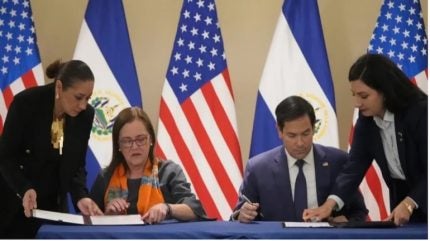
US Secretary of State Marco Rubio and Foreign Minister Alexandra Hill Tinoco of the Republic of El Salvador have signed a Memorandum of Understanding Concerning Strategic Civil Nuclear Cooperation (NCMOU) with the aim of advancing peaceful nuclear cooperation.
The US State Department said the NCMOU “represents an initial step towards establishing a robust civil nuclear partnership between the United States and El Salvador with the aim of enhancing energy security, promoting mutual prosperity through expanded economic cooperation, and promoting the highest standards of nuclear safety, security, and non-proliferation”.
It added that NCMOUs are important diplomatic tools developed during President Trump’s first term in office that lay the foundation for expanding strategic ties between the US and its partners “thereby making the United States safer, stronger, and more prosperous through the promotion of US industry and workforce”.
Rubio and Hill Tinoco agreed to collaborate on small modular reactors (SMRs) and regulatory training, aiming to supply 26% of El Salvador’s electricity through nuclear energy by 2050.
El Salvador’s October 2024 Nuclear Energy Law prioritises reduced reliance on oil imports that once consumed 69% of its energy budget. The country plans to train 400 nuclear specialists by 2030, supported by Argentina’s atomic energy agency and IAEA safety protocols.
Daniel Álvarez, director of Energy, Hydrocarbons & Mines, at the time provided further insight into the government’s plans on local television. He mentioned that El Salvador aims to have its first research nuclear reactor operational within seven years.
Currently, El Salvador relies heavily on renewable energy sources, with official data indicating that by the end of 2022, 83% of the country’s electricity consumption came from renewable sources. This new law represented a strategic move towards diversifying the nation’s energy portfolio by incorporating nuclear energy as a potential future source.
Commenting on the deal with the US, Rio Times noted: “This pact underscores how energy policy increasingly drives geopolitical realignments, blending technological pragmatism with hardline governance strategies.” It added: “For investors, the agreement signals emerging opportunities in Central America’s energy sector, particularly SMR development. Policymakers watch for ripple effects in migration diplomacy and US-China competition. Nuclear tech now serves as both an economic tool and a political lever.”






